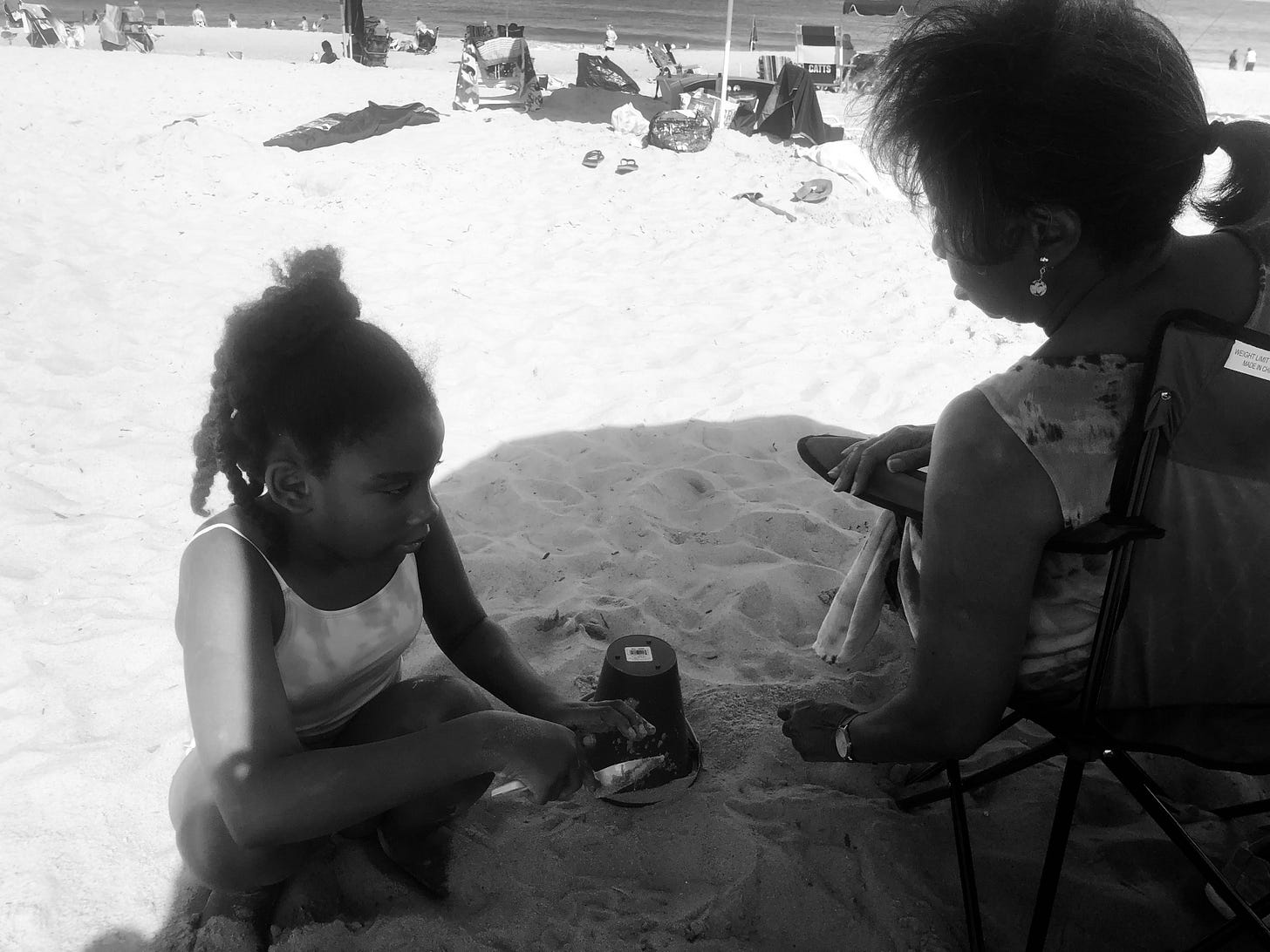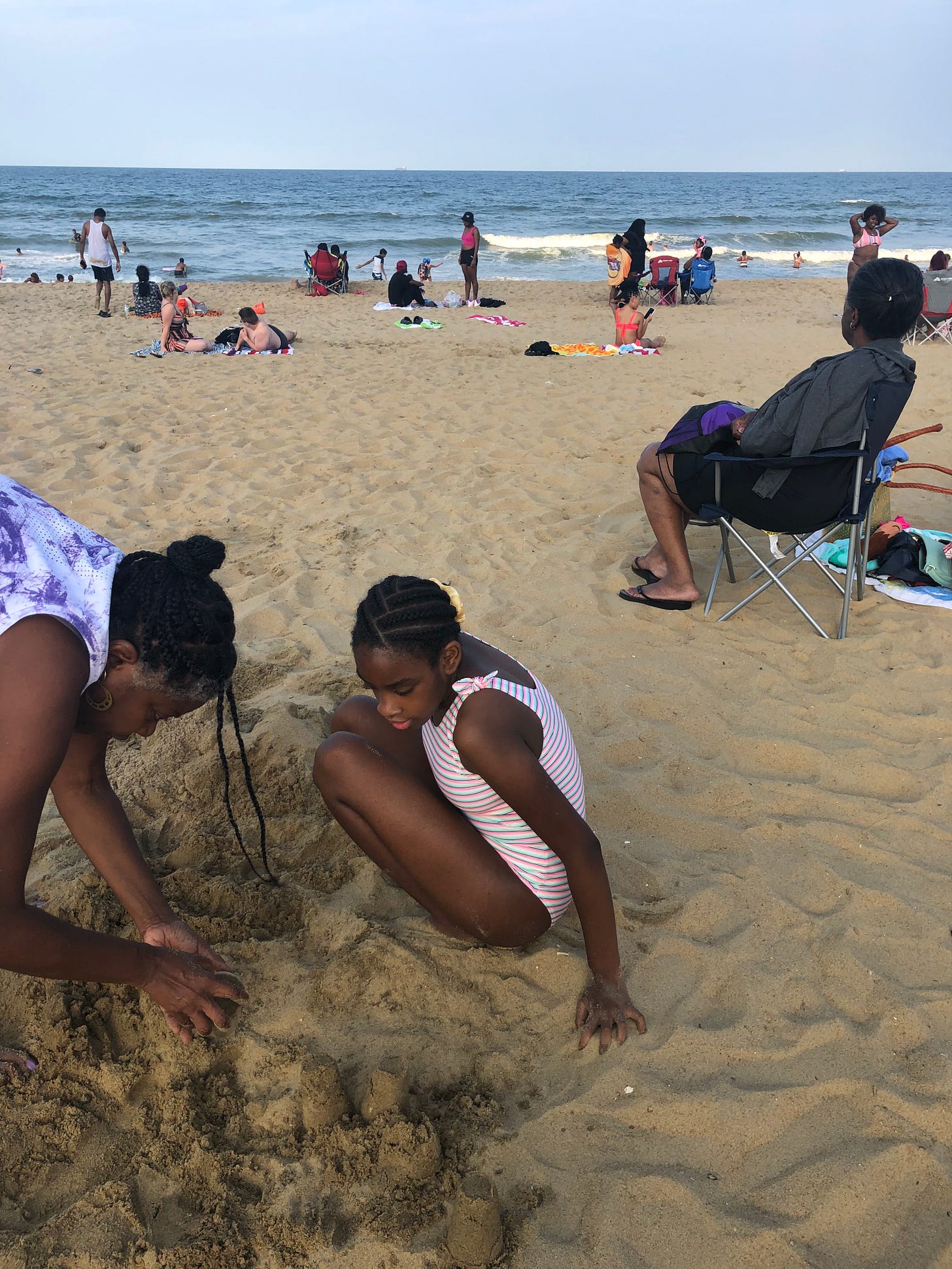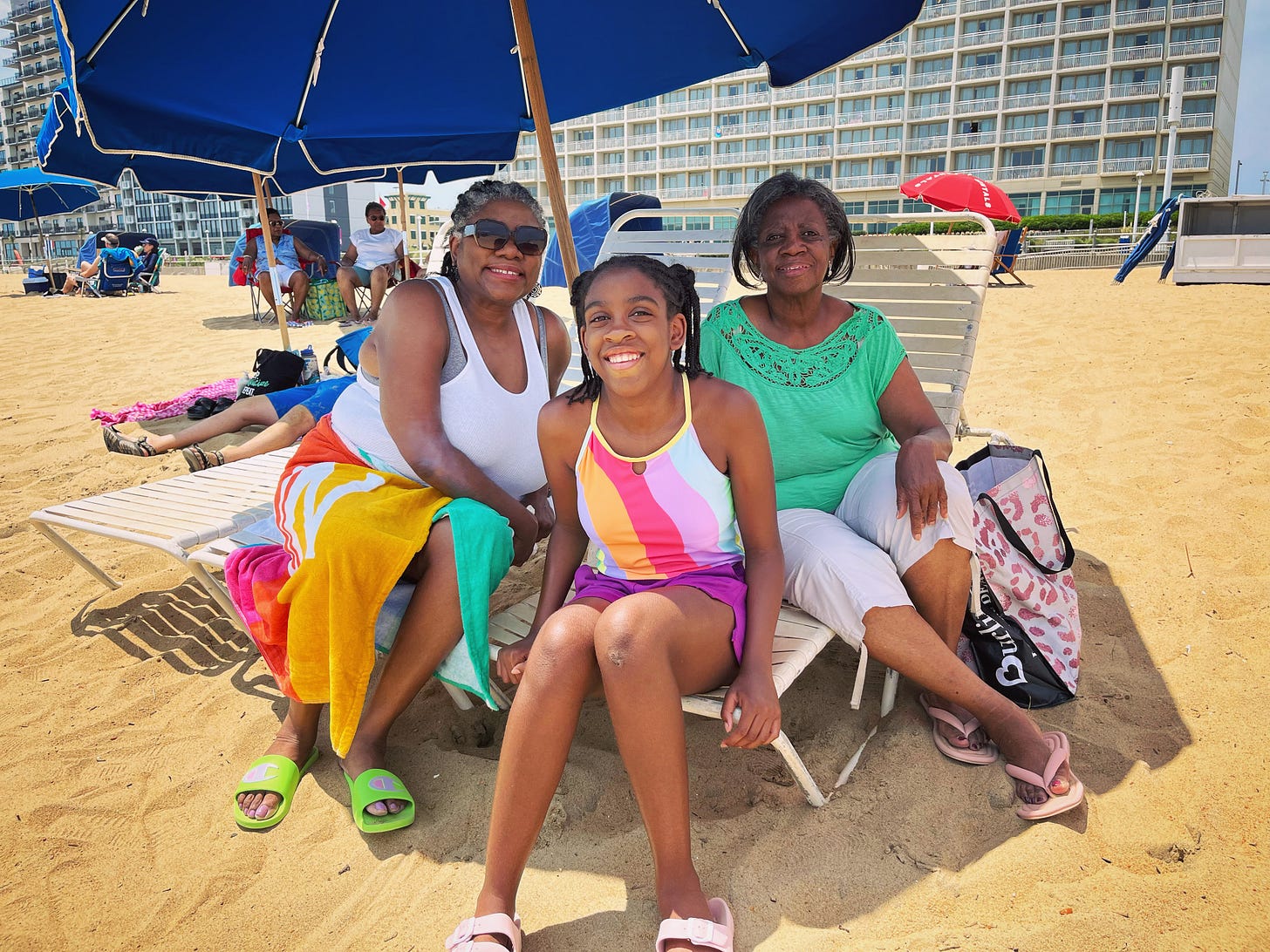Video Credit: Story J. Brown
The first night, there was a fire.
This, moments after GPS navigated me to the wrong hotel – or rather the one I wrongly booked: Courtyard at Marriott Virginia Oceanfront South, rather than last year’s far superior Courtyard at Marriott Virginia Oceanfront North. No one else in the car understood why my mood immediately darkened upon realizing my error, so no one else in the car expected the front desk clerk’s announcement that the suite I’d booked—the corner suite with the kitchenette and sitting room—was unavailable for our three-night stay.
“Hopefully the good news will make up for the bad,” the clerk offered. “We’re giving you two double queen rooms – with an adjoining door, so you’ll still be connected. It’s more space; you just lose the kitchenette.”
It already felt like I’d lost more than the kitchenette.
I’d lost my expectation of an oasis at the end of a five-hour drive. I’d lost the letting-go I’d hoped to do, the vanquishing of certain anxieties I’d anticipated since I booked the trip four months ago. My guard was up now, higher than it always was when I hosted our summer getaway, because now there would be disappointments to mitigate, inconveniences to circumvent.
Perhaps unnecessarily, during these annual trips, I carry the burden of everyone’s good time on my back, and every bump in the road makes the weight feel heavier.
No vacation is perfect. But I’d set the bar for seamlessness high last summer—a redemption arc for the summer before that—and this year, I was already falling short of it at check-in.
The smile I mustered for the front desk clerk was tepid at best. Dourness settled over me as I thanked her, my mind already drifting to predictions of what awaited us upstairs. Though I’d never stayed at this location before, I guessed by its proximity to the older, noisier, more centrally located part of Atlantic Avenue that it would be dingier and less comfortable than its sister hotel, about one mile up, on the redeveloping stretch of the road.
We decided to go up to the ninth floor to see the adjoining rooms before unloading the car. The elevator was damp, its air thick with the warring scents of sunscreen, over-sprayed cologne, fried foods and chlorine. The carpet in the hall on the ninth floor seemed steeped in years of sand and grime.
I turned toward the long row of windows overlooking the parking lot and that’s when I first spotted the smoke. Translucent gray clouds at first, though in the short walk from the elevator to our rooms, the clouds seemed to thicken into long, dark, rising plumes. The fog was too dense to decipher the exact location, but a fire was definitely in progress nearer than was comfortable.
“That can’t be good,” one of us muttered. It might’ve been me.
We stood there a minute more, watching as cyclists stilled their bikes and pedestrians whipped out their phones to record. We looked down from the windows at my parked Sante Fe.
“Our clothes are gonna smell like smoke…” Mom predicted.
I hope it doesn’t spread, was my mental contribution. I knew better than to speak it aloud. If they’re feeling generous, my anxieties alert me when they’re unwise to voice.
My daughter found the fire thrilling. She’d never witnessed one firsthand. Nana’s expression was inscrutable as she looked on.
Nana goes quiet more often now. She is two weeks from turning 81. Her age and the changes it’s ushering in require mental adjustments I’ve yet to comprehend, much less implement.
The rooms were fine. The carpet inside them were as grime-laden as the ones in the hall. An unsightly “no smoking or vaping” sticker affixed to the smudged inner glass obstructed the beachfront view. The bathroom was a bit of a nightmare: a long crack ran sidelong across the wall inside the shower. A low dark ring, clearly resistant to whatever cleansers the hotel used, was visible an inch from the floor of the tub. I admonished myself not to examine any crevice too closely.
Accept that this experience, as all hotel experiences, will be vaguely unclean. Just hope it does not prove itself indisputably filthy.
We opened the double doors adjoining our rooms and I scanned my mother and grandmother’s faces. They were being careful not to add to my discontent. I was being careful to temper it with more mental messages:
We still have a balcony. Two, in fact. Two bathrooms. Four beds! One for each of us. It’s good. This is still good. I am grateful.
But I wasn’t feeling gratitude yet.
We headed back to the hallway, where just beyond the window glass, we saw a billowing mushroom cloud, double the size of the smoke we saw coming in.
It made the most sense to retrieve our bags before things got even worse. Given the gathering charcoal gusts, it was impossible to tell how far the fire’s origin was from the hotel parking lot.
I decided to spend the rest of the first night grappling with acceptance. These were less than ideal circumstances but I couldn’t let this turn into a less than ideal vacation. I’d worked too hard to plan and pull it off. By morning, I’d have to let go of my preconceived hopes and invoke new expectations.
The summer before Story and I moved to North Carolina, the four of us—us and my mother and hers—rode to Rehoboth one day in July.
For a few years by then, Nana had been promising Story that she’d take her to the beach one day.
Nana is a promiser. There are things she finds especially important to impart to children: family, faith, cultural exposure, travel. All her promises to my daughter align with these ideals. I recognize them as the same promises she used to make to me when I was a girl.
Maybe we’ll go to this place. Maybe we’ll make our way there. One day I’ll have to take you. Maybe in summer. On Christmas break. In a few weeks. Next time you visit.
When I was young, Nana’s maybes often materialized. She was a young grandmother, only 36 when I was born. I took her youth for granted. While I was growing up, she still had the willful determination of a woman who’d raised a child all on her from the age of 17 and put herself through stenography courses at night while working two jobs by day and attempting to find a decent man to date in her limited time off.
She kept her word as often as she could and when she couldn’t, it was because the reach of her good intentions exceeded our practical or financial grasp.
I learned over time to appreciate the intention more than I expected the follow-through. It’s a lesson that still serves me well, discerning the difference between a promise that’s empty and one that might be fulfilled. The latter may prove as fruitless as the former but only the empty promise deserves my ire. The other can earn my understanding.
By the time my daughter was born, Nana was not a young grandmother anymore but I had yet to notice. She was in her mid-70s when she began the beach promises to Story and they still sounded as plausible as any of her others. I assumed that, when she was ready, she’d plan the beach day on her own and we’d fall in line with whatever she decided.
In the end, it was more of a collaborative effort. My mother drove but I can’t recall if we rented a car or used mine or Nana’s. We got a late start and an even later return home. Still, during the long drive back, we chatted about how nice it had been to get away together, the four of us traveling for no reason other than leisure.
“We should do this again, but longer next time,” my mother mused.
I looked over at my sun-drunk daughter, barely holding her eyelids open beside me in the backseat, and answered, “Definitely.”
It is hard for single mothers to maintain an annual practice of summer vacationing—especially those of us who are not consistent high-earners. Every penny goes to necessities—food, shelter, clothing. Anything leftover is often eaten up in emergencies and incidentals.
I didn’t grow up vacationing with my mother and grandmother every year. I can’t remember vacationing with them in any year of my childhood—although maybe the occasional day trip to a local amusement park counts? When we traveled together it was usually to see family back in Michigan. Once or twice all three of us made our way to a family reunion in Mississippi but those were even rarer occasions.
Family visits don’t quite count as vacation, do they? They cannot be counted as pure recreation. They ask things of us that independent vacations do not. They are meant to maintain our bonds with the relatives we wouldn’t otherwise see. Vacations aren’t meant to exact any toll at all; they’re intended purely to replenish us, to temporarily absolve us of daily obligation, to offer an entirely different view of the world we spend the rest of the year barreling through.
Family vacations—those we take with our relatives to a neutral destination—exist at the overlap of the Venn diagram: they require something, even as they reinvigorate us.
My father’s family took many summer trips together. The practice began with my grandparents, who once drove cross country from Muskegon to California. Another time, when I was an infant, they invited my mother to bring me with them on a trip to Toronto. They’re my RV-and-cabin side of the family. My “Up North” side of the family. I only know what the upper peninsula looks like because of them. I’ve only seen Mackinac Island because they took me. Disney World, too.
Once I was old enough to notice what went into planning those trips—the logistical energy of each, from booking for over a dozen people and hoping for the best when it was time for reimbursement, to scheduling transport to and from the destination via multi-car caravan, to programming the days in such a way that lan hourly itinerary was offered but not overpacked with inflexibly-booked excursions—I realized how unenviable the position of family trip planner can be.
Everyone loves a vacation except the person tasked with organizing it.
There are tacit expectations of the planner. She must take care never to view herself as a martyr. Though she is taking on all of the driving, 95% of the expense for four travelers for four days, resistance and defecting from things she’s planned, the occasional muttered complaint and every expectant look that follows the daily (sometimes hourly) question: what will we do next?, she cannot feel put-upon or even too annoyed.
It was her idea, after all. She did not have to do this.
The expense must never be mentioned. She would do well to put it out of even her own mind. No one can enjoy a trip where every cost is counted; you must spend what as though you will recoup the cost, spend as though you’ve forgotten how sizable an object money is for women like you, spend as though you haven’t just lost the jobs that paid for the previous years’ trips.
Spend, because the women who came before you made costly promises and kept them.
Rudee Tours, Dolphin Watching Boat, 2023
Though the fire was quelled by the second day of our stay on Virginia Beach, it remained the talk of the strip the whole time we were there. Passersby stopped to stare at what remained of a t-shirt factory less than a block from our hotel. We saw cameramen across from it every day that we drove by. A news chopper circled every few hours.
When news reports began trickling in, we realized that the fire took five hours and 75 firefighters to put out. It destroyed three businesses in total and scorched the corner of what looked like a building of condos behind it.
It seemed impossible that it didn’t interfere with our trip. Our rooms, despite their age, dinginess and inexplicable accumulation of balcony gnats, served us well, too.
We spent hours together in the sun, celebrated my mother’s birthday at a seafood buffet, cruised across the beach and watched for dolphins.
“This was a nice day,” Nana said just before the dolphin boat docked. “I enjoyed this.”
I was tempted to wonder if she remembered the night before, when she and I had a small, confusing, private row that resulted in her deciding to stay in her hotel room while the rest of us went to the birthday buffet. I was tempted to wonder if she would remember the details of this better, nicer day in the week to come.
But I knew it didn't matter. Forgetfulness is cruel until all the tiny fissures it causes float away as readily as everything else. It’s then that you can almost be grateful for it.
On vacation, there are always things to forget. Practical things, like which hotel you booked the year before. Existential things like how you’ll afford the decisions you made, just before you knew for sure that you’d be losing your job. Emotional things, like future implications of everyone’s advancing age. Nana is 81. Mom just turned 63. I’ll be 44 in November. Story will embark on her teen years in just two weeks’ time.
I can’t take it, I think, before slipping out to the balcony the day before our departure. I cue up a song on my laptop and dance. I haven’t danced like this in ages. I used to do it all the time. I’d forgotten how freeing it could be. This was all I wanted. Rejuvenation. A jogging of memory.
I remember to be proud of the respite I’ve created. I remember all the respites past someone created for me. And there, in the lingering heat of dusk, I am grateful. I can be ready to face the summer’s end, the waiting fall.
I dance and dance and dance. Just because.
I can.








I don’t think most of us really expect or understand the slow reversal of roles as our parents age. Mine are of age as your Nana. I’ve slid into it seemingly with ease, maybe mostly because I know I can’t fight it. It’s heavy but at least I can.